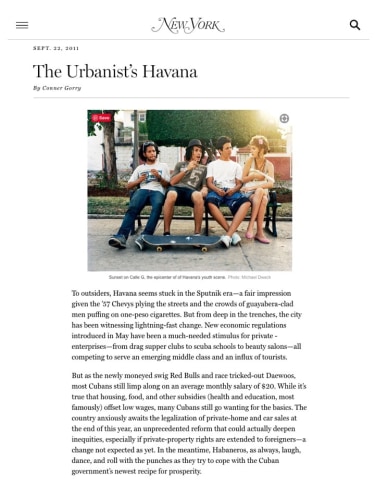The Urbanist’s Havana
New York Magazine
09/22/2011
Back
By Conner Gorry
To outsiders, Havana seems stuck in the Sputnik era—a fair impression given the ’57 Chevys plying the streets and the crowds of guayabera-clad men puffing on one-peso cigarettes. But from deep in the trenches, the city has been witnessing lightning-fast change. New economic regulations introduced in May have been a much-needed stimulus for private enterprises—from drag supper clubs to scuba schools to beauty salons—all competing to serve an emerging middle class and an influx of tourists.
But as the newly moneyed swig Red Bulls and race tricked-out Daewoos, most Cubans still limp along on an average monthly salary of $20. While it’s true that housing, food, and other subsidies (health and education, most famously) offset low wages, many Cubans still go wanting for the basics. The country anxiously awaits the legalization of private-home and car sales at the end of this year, an unprecedented reform that could actually deepen inequities, especially if private-property rights are extended to foreigners—a change not expected as yet. In the meantime, Habaneros, as always, laugh, dance, and roll with the punches as they try to cope with the Cuban government’s newest recipe for prosperity.